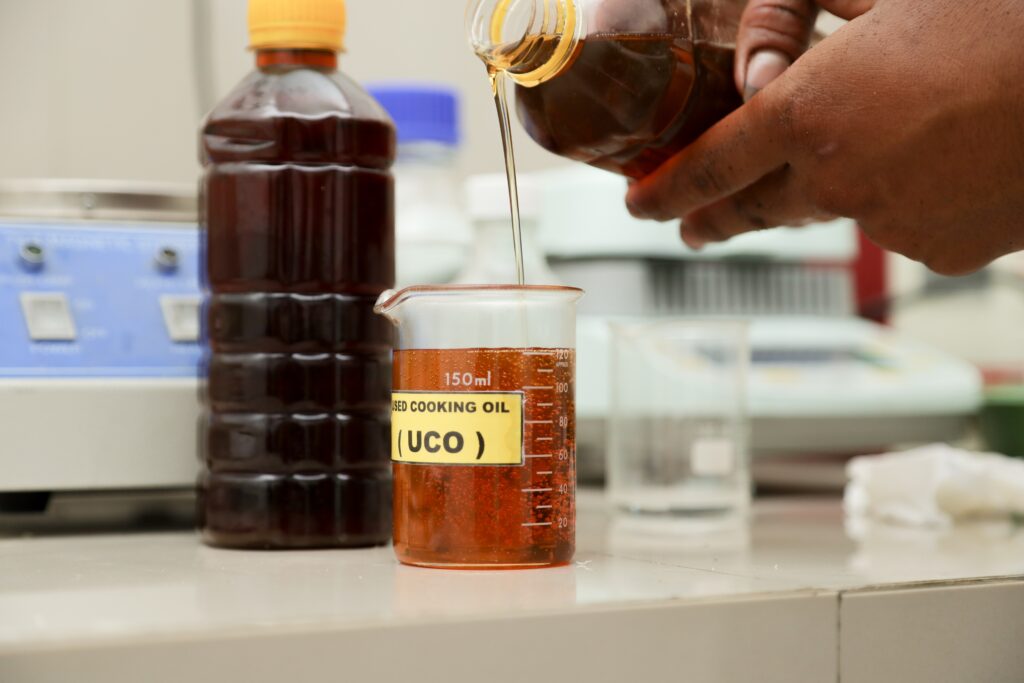Could used cooking oil revolutionise our approach to fuel consumption and sustainability? Dominic Wyatt from the International Drivers Association argues that cooking oil is a biofuel that could play an essential role in a fossil-fuel-free future.
Vast amounts of used cooking oil go to waste daily, but what if we could repurpose this overlooked source into a valuable, renewable energy commodity? This year, Chevron, a crude oil manufacturer, powered three Toyota cars with biofuel from cooking on a trip across the US to demonstrate that biofuel might provide a better option for decarbonising road transport than battery-powered vehicles.
Biofuels are fuels made from living or recently deceased biological material, unlike fossil fuels, which derive from long-deceased biological matter. Fuel types include biodiesel, ethanol, and green diesel, each applicable in various vehicles. In addition to being renewable and sustainable, the benefits of biofuels include reducing greenhouse gas emissions, reducing reliance on foreign oil, reuse of waste products, and increasing fuel economy. But can cooking oil be used to contribute to the meaningful decarbonisation of the transport sector?
The science
‘Ordinary cooking oil is not so ordinary when it comes to fuelling our cars,’ says Dominic Wyatt from the International Drivers Association. He explains that producing biofuel from used cooking oil involves a process known as transesterification. This encompasses a reaction between the cooking oil and an alcohol – usually ethanol or methanol – in the presence of a catalyst. This reaction results in biodiesel and glycerol, a valuable by-product used in numerous industries.
‘Think of it as a cooking recipe. You start with your used oil, mix it with alcohol, and turn on the heat. The result won’t be a tasty dish, but it will be an environmentally friendly, high-performing biofuel.
‘In theory, with some minor chemical tweaks, used cooking oil, or UCO can be blended seamlessly into the fuel from a gas pump. The only downside is that there isn’t enough used cooking oil to power cars worldwide as only 200 million tonnes are produced yearly, compared to five billion tonnes of crude oil.’
Making the change
Dominic advises that switching from conventional fuels to biofuels may involve modifying older vehicles to accommodate the new substance. ‘Before beginning to use biofuel, consult with a professional. They will guide you on potential modifications to ensure your vehicle runs smoothly.’
However, these changes could prove beneficial over time. Investing in biofuel might not only contribute to reducing environmental harm but also bring cost-saving benefits, as biofuels have the potential to become cheaper alternatives to fossil fuels.
Used cooking oil remains a largely untapped resource, but harnessing its potential by converting it into biofuel could prompt industry-wide changes. ‘It represents a sustainable path forward, which could dramatically decrease our reliance on non-renewable resources and significantly affect our handling of waste products,’ says Dominic. ‘We have to rethink our approach to fuel to achieve sustainability. And unused cooking oil as biofuel for cars offers a genuinely feasible solution.’
The idea provides a potentially compelling example of how innovative thinking can transform waste into something beneficial. ‘As we look to the future of sustainable resources, converting unused cooking oil into biofuel might help optimise our resources, advocate sustainability, and ultimately inspire us to think differently about waste.’




